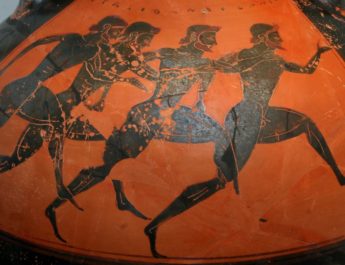Isaiah 50:4-9a
Passion Sunday A
4 The LordA GodB has givenC me
a trainedD tongue,E
A “Lord” = Adonai. From adon (lord, master, owner); root means to rule or be sovereign. This is the actual Hebrew word for Lord used (in a different form) of humans and (in the present form) of God. It means someone who is in control.
B “God” = YHVH. From YHVH (proper name of the God of Israel; God, Lord; the self-existent or eternal one); from havah (to become) or hayah (to be, become, happen)}. This is the name of the God of Israel, the self-existent and eternal one, the tetragrammaton. This pronunciation has been lost to time so “Lord” is generally used in its place.
C “given” = natan. This is to give, put, set, offer. It is to give literally or figuratively.
D “trained” = limmud. 6x in OT. From lamad (properly, goading – using a pointed stick to guide or prod one’s flock; by implication, teaching or instructing). This is disciple, instructed, teacher.
E “tongue” = lashon. This is tongue, talker, language, or wedge. It can also be a tongue of flame or a water cove.
that I may knowF how to sustainG
the wearyH with a word.I
F “know” = yada. This is to know, acknowledge, advise, answer, be aware, be acquainted with. Properly, this is to figure something out by seeing. It includes ideas of observation, recognition, and care about something. It can be used causatively for instruction, designation, and punishment.
G “sustain” = uth. 1x in OT. Perhaps from ush (to help, hurry, gather self). This is to help, hurry.
H “weary” = yaeph. 3x in OT. From yaeph (becoming tired or exhausted as following flight; to faint). This is weary, faint, exhausted.
I “word” = dabar. From dabar (to speak, declare, discuss). This is speech, a word, a matter, an affair, charge, command, message, promise, purpose, report, request. It is a word, which implies things that are spoken of in a wide sense.
MorningJ by morning he wakens,K
wakens my earL
to listenM as those who are taught.N
J “morning” = boqer. From baqar (to seek, plow, break forth, admire, care for). This refers to the break of day. So it is dawn, early, morning, or morrow.
K “wakens” = ur. This is to arise, lift, exult, or stir. It is to wake in a literal or figurative sense.
L “ear” = ozen. This is ear, hearing, audience, show. Properly, it is broadness – applied to its ear in reference to its shape.
M “listen” = shama. This is to hear, call, consent, or consider. It implies listening intelligently, giving attention, and, because of these two factors, obedience and action are often implied.
N “taught” = limmud. Same as “trained” in v4. See note D above.
5 The Lord GodO has openedP my ear,
and I was not rebellious;Q
I did not turnR backward.S
O “God” = YHVH. Related to “God” in v4. See note B above. It has the same meaning with a different vowel pointing.
P “opened” = pathach. This is to open wide in a literal or figurative sense. So, it is open, draw out, let something go free, break forth. It can also mean to plow, engrave, or carve.
Q “rebellious” = marah. This is to be contentious, rebellious, bitter, provoking, disobedient. It can be to be or make bitter or unpleasant. Figuratively, it is to rebel or resist and causatively to provoke. This is the root of “Miriam.”
R “turn” = sug. 14x in OT. This is to turn back, aside, or away. Properly, it means to flinch, which implies moving away or going back. Literally it can mean retreat or figuratively it can mean backslide i.e. apostatize.
S “backward” = achor. From achar (to be behind, delay, be late, procrastinate, continue). This is the back, behind, backward, time to come. It can also refer to facing to the north or the west.
6 I gave my backT to those who struckU me
and my cheeksV to those who pulled out the beard;W
T “back” = gev. 7x in OT. From ga’ah (to rise up, increase, grow, be highly exalted; figuratively to be majestic). This is the back or body. By analogy, it is among or in the middle.
U “struck” = nakah. This is to hit whether lightly or severely. It can be used in a literal or figurative sense. So, this could be beat, punish, give wounds, kill, or slaughter.
V “cheeks” = lechi. Root may refer to softness. This may be jaw bone or cheek.
W “pulled out the beard” = marat. 12x in OT. This is to be smooth or bald. It can also be to polish or sharpen.
I did not hideX my faceY
from insultZ and spitting.AA
X “hide” = sathar. This is hide, conceal, or be absent. It is hiding because something is covered – used in a literal or figurative sense.
Y “face” = paneh. From panah (to turn, face, appear). This is face in a literal or figurative sense. It could be face, presence, anger, respect. It can also be used of God to indicate divine favor or presence.
Z “insult” = kelimmah. From kalam (bearing shame, bringing dishonor or disgrace, humiliate insult, taunt, embarrass, reproach; properly to wound in a figurative sense). This is insult, disgrace, dishonor, humiliation, shame, or reproach.
AA “spitting” = roq. 3x in OT. From raqaq (to spit). This is spittle or to spit.
7 The Lord GodBB helpsCC me;
thereforeDD I have not been disgraced;EE
therefore I have setFF my face like flint,GG
and I know that I shall not be put to shame;HH
BB “God” = YHVH. Same as “God” in v4. See note B above.
CC “helps” = azar. This is to surround, which implies encircling to protect someone or help them out. It can also be help, ally, or support.
DD “therefore” = ken. Perhaps from kun (properly, in a perpendicular position; literally, to establish, fix, fasten, prepare; figuratively, it is certainty, to be firm, faithfulness, render sure or prosperous). This is to set upright. Generally used figuratively to mean thus, so, afterwards, rightly so.
EE “disgraced” = kalam. Related to “insult” in v6. See note Z above.
FF “set” = sim. This is to put or place in a literal or figurative sense. It can be appoint, care, change, make, and may other things.
GG “flint” = challamish. 5x in OT. Perhaps from chalam (properly, to bind solidly and be plump; to be healthy or strong, to recover; figuratively, to dream). This is flint or a flint rock.
HH “be put to shame” = bosh. Properly, this means to be pale, which implies shame, disappointment, or confusion.
8 he who vindicatesII me is near.JJ
Who will contendKK with me?
II “vindicates” = tsadeq. From tsedeq (rightness, righteousness, just cause, vindication; that which is right in a natural, moral, or legal sense; abstractly equity; figuratively prosperity). This is being just or righteousness. It refers to right in a moral or legal sense. So, it can be doing justice, clearing oneself, or turning to righteousness.
JJ “near” = qarob. From qarab (to come near, offer, make ready). This is near whether nearby, related, near in time, or allied.
KK “contend” = rib. This is properly to toss or grapple. It is used figuratively to mean wrangling and so for arguments, complaints, or disputes. It is used in a legal setting for pleading or defending a case.
Let us standLL in courtMM together.NN
Who are my adversaries?OO
Let them confrontPP me.
LL “stand” = amad. This is to stand up in a literal or figurative sense. So it can be establish, continue, endure, take a stand, act, be a servant, stand still, remain, stand against an enemy.
MM “court” = mishpat. From shaphat (to judge, defend, pronounce judgment, condemn, govern). This is a verdict or formal sentence whether from humans or from God. It includes the act of judging as well as the place that judging takes place, the suit itself, and the penalty. Abstractly, this is justice, which includes the rights of the participants.
NN “together” = yachad. From yachad (to join, be united). This is a unit, both, altogether, unitedness, alike.
OO “adversaries” = ba’al. From baal (to marry, have dominion, be master). This is lord, owner, ally, or archer.
PP “confront” = nagash. This is to draw, bring, or come near. It is approaching for any reason – as an attack on an enemy, in order to worship, to make an argument. It can also be used as a euphemism for sex.
9 QQIt is the Lord GodRR who helps me;
who will declare me guilty?SS
QQ {untranslated} = hen. This is a remark of surprise or excitement: lo! Behold! It can also mean if or though.
RR “God” = YHVH. Same as “God” in v4. See note B above.
SS “declare…guilty” = rasha. From resha (wrong, particularly moral wrong; wickedness, evil, wicked deeds, or something that is ill-gotten). This is to be or do something wicked, condemn, give punishment, vex, disturb, or violate.
TTAllUU of them will wear outVV like a garment;WW
the mothXX will eat them up.YY
TT {untranslated} = hen. Same as {untranslated} in v9. See note QQ above.
UU “all” = kol. From kalal (to complete). This is all or every.
VV “wear out” = balah. 17x in OT. This is to grow old, wear out, consume, waste, enjoy, fail, decay.
WW “garment” = beged. From bagad (to cover or conceal; figuratively, to act in a covert or treacherous way, to transgress or pillage). This is clothing, garment, robe, or some other kind of clothing. Figuratively, it can be treachery or pillaging.
XX “moth” = ash. 12x in OT. From ashesh (to shrink or waste away; figuratively, to fail or be consumed). This is moth, moth-eaten, maggots, or grass.
YY “eat…up” = akal. This is to eat, devour, burn up, or otherwise consume. It can be eating in a literal or figurative sense.
Image credit: “Head of the Sun” by Raymond Tarrit, 2008.




